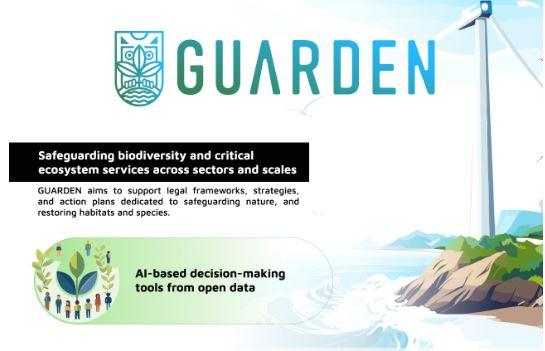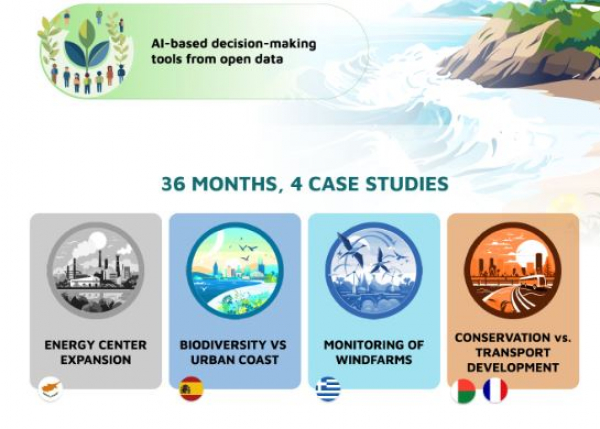- Home
- Worldwide
- CIRAD worldwide
- Projects
- GUARDEN Project
Safeguarding biodiversity and critical ecosystem services across sectors and scales - GUARDEN

Synthetic view of the main objectives for which GUARDEN methods and tools will be developed © CIRAD
Issues
Several legal frameworks, strategies and action plans have been established by the international and European communities to protect nature, restore habitats and conserve species. However, one of the main challenges of biodiversity governance is the series of trade-offs that emerge across sectors and spatial scales, for example between conservation policies and economic development programmes, or in adapting regional policies to the national or local level. The value of biodiversity and ecosystems must be taken into account across all economic sectors and policy areas in order to address the many challenges our society faces today.
It is therefore necessary to improve decision making capacities in management and conservation, with a view to ensuring a more effective, user-oriented approach.
To this end, we need:
- new databases for structured observation of species;
- relevant indicators and more accurate predictive models at the local level to better anticipate the potential impacts of global change on biodiversity and nature’s contributions to people;
- effective decision support applications;
- governance structures that bring together complementary groups of stakeholders to take decisions and measures for the collective good.
Description
The main goal of GUARDEN is to play a role in safeguarding biodiversity and its contributions to people by bringing them to the forefront of policy and decision making.
This will be achieved through the development of user-oriented decision support applications, building on multi-stakeholder partnerships. These applications will take account of policy and management objectives and priorities in the case studies within which they will be tested.
The goal will be to build consensus to tackle data gaps and uncertainties in the analyses they will enable. To do so, GUARDEN will use a series of methods and tools based on citizen science, deep learning and Earth observation to increase the quantity of standardised and geolocalised biodiversity data, to build a new generation of predictive models for indicators of biodiversity and ecosystem status under multiple pressures (human and climate), and to propose a set of complementary ecological indicators that could be incorporated into local management and policy.
Expected results
The objectives of the GUARDEN project are:
- to develop multi-stakeholder partnerships to improve the governance of biodiversity and ecosystem service monitoring;
- to deliver new open, scalable, secure and interoperable methods to quantify and characterise changes in biodiversity and related ecosystem services, and to quantify the impacts of the main direct drivers of change;
- to deliver a set of tailored IT tools that transform scientific outputs into actionable knowledge suited to the needs of end users;
- to accelerate the adoption of new decision support tools to enable a broader community to implement the European Green Deal and the biodiversity strategy.
France:
- Institut national de recherche en informatique et automatique (Inria) ;
- Parc national de Port-Cros (CBNM) ;
Spain:
- Agencia estatal consejo superior de investigaciones cientificas (CSIC) ;
- Area Metropolitana de Barcelona (AMB) ;
Greece:
- Charokopeio Panepistimio (HUA);
- Institute of communication and computer systems (ICCS) ;
- Enveco Anonymi Etairia Prostasias Kai Diahirisis Perivallontos A.E. (ENV) ;
- Draxis Environmental SA.
Madagascar:
- University of Antananarivo (UNTNR).
Netherlands:
- Stichting Naturalis Biodiversity Center (NBC).
Belgium:
- Agentschap Plantentuin Meise (MBG).
Cyprus:
- Frederick University (FREDU) ;
- Ebos Technologies Limited ;
- Ministry of Agriculture, rural development and environment of Cyprus (MOA).
United Kingdom:
- Plymouth Marine Laboratory Limited (PML).

























